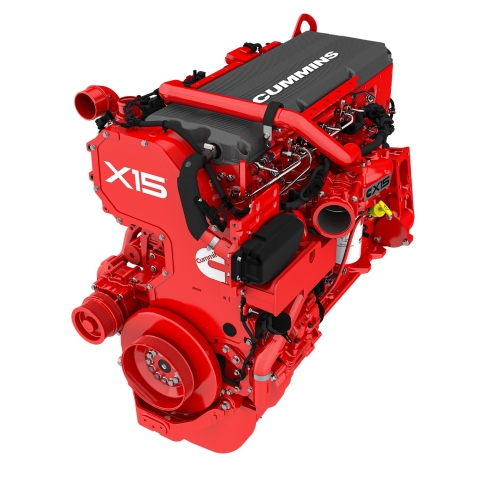Cummins and Tula Study of Diesel Dynamic Skip Fire (dDSF™) Shows 74% Reduction in NOx Emissions
Cummins Inc. (CMI) and Tula Technology announced a study showcasing Tula’s diesel Dynamic Skip Fire (dDSF™) technology that significantly reduces nitrogen oxides (NOx) and carbon dioxide (CO2) emissions. The study revealed a 74% reduction in NOx and 5% reduction in CO2 emissions compared to current clean diesel technologies. Additionally, the technology demonstrated a 20% fuel savings during engine operations. This advancement supports Cummins’ goal to meet stringent future NOx emissions regulations.
- 74% reduction in NOx emissions
- 5% reduction in CO2 emissions
- 20% fuel savings demonstrated with dDSF technology
- Alignment with stringent future NOx regulations
- None.
Insights
Analyzing...
Cummins Inc. (NYSE: CMI) and Tula Technology, Inc., a leader in propulsion efficiency, announced today at the Society of Automotive Engineers World Congress in Detroit the results of their collaborative study on the effectiveness of Tula’s diesel Dynamic Skip Fire (dDSF™) in reducing nitrogen oxides (NOx) and carbon dioxide (CO2) emissions on a Cummins X15 HD Efficiency Series diesel engine.

Cummins’ X15 Efficiency Series 6-cylinder diesel engine enhanced with Tula’s diesel Dynamic Skip Fire (dDSF) (Photo: Business Wire)
Low-load cycle performance was estimated with a well-calibrated powertrain simulation tool to accurately capture the low-load system operation and emissions. This system showed a 74 percent reduction in NOx and a 5 percent reduction in CO2 compared with today’s clean diesel technologies. In comparison with current engine technologies and modifications to the thermal management techniques, dDSF saved
Cummins and Tula demonstrated the positive dDSF results in a Class 8 truck powered by a Cummins X15 HD engine. The dDSF test results highlight a promising technical advancement for an industry seeking strategies to address future, more stringent NOx emissions regulations for diesel engines.
“Our mission at Cummins is to make people’s lives better by powering a more prosperous world, and we accomplish this through innovation,” said Lisa Farrell, Director, Accelerated Technology Center for Cummins Inc. “Tula’s dDSF technology provides significant benefits to reducing NOx and CO2 emissions under low-load vehicle operation, which will aid our efforts to produce more reliable, more powerful engines while meeting our environmental goals.”
“NOx standards are becoming progressively more stringent for diesel engines, and meeting those standards is increasingly challenging, even for a class-leading, efficient engine like the Cummins X15 HD,” said R. Scott Bailey, president and CEO of Tula Technology. “Our dDSF is a powerful and unique technology that enables original equipment manufacturers to significantly reduce NOx emissions that contribute to smog while simultaneously reducing fuel consumption and greenhouse gas production. We appreciate the opportunity to work with Cummins to demonstrate the capability of our technology.”
Dynamic Skip Fire is an advanced cylinder deactivation control strategy that makes decisions for an engine’s cylinders on an individual basis to best meet torque demands while saving fuel and maintaining performance. Tula’s original Dynamic Skip Fire (DSF®) software has been shown to significantly reduce CO2 emissions in gasoline engines and has been in production since 2018 with more than one million vehicles on the road. dDSF is the Dynamic Skip Fire application for diesel engines.
About Cummins Inc.
Cummins Inc., a global power leader, is a corporation of complementary business segments that design, manufacture, distribute and service a broad portfolio of power solutions. The company’s products range from diesel, natural gas, electric and hybrid powertrains and powertrain-related components including filtration, aftertreatment, turbochargers, fuel systems, controls systems, air handling systems, automated transmissions, electric power generation systems, batteries, electrified power systems, hydrogen generation and fuel cell products. Headquartered in Columbus, Indiana (U.S.), since its founding in 1919, Cummins employs approximately 57,825 people committed to powering a more prosperous world through three global corporate responsibility priorities critical to healthy communities: education, environment and equality of opportunity. Cummins serves its customers online, through a network of company-owned and independent distributor locations, and through thousands of dealer locations worldwide and earned about
About Tula Technology, Inc.
Silicon Valley-based Tula Technology provides innovative award-winning software controls to optimize propulsion efficiency and emissions across the mobility spectrum, including gasoline-powered, diesel, alternative fuel, hybrid, and electric vehicles. Tula’s culture of innovation has resulted in breakthrough technology and a robust global patent portfolio of more than 340 patents issued and pending. Tula Technology is a privately held company backed by Sequoia Capital, Sigma Partners, Khosla Ventures, GM Ventures, BorgWarner and Franklin Templeton. More information is available at www.tulatech.com.
View source version on businesswire.com: https://www.businesswire.com/news/home/20210413005025/en/







